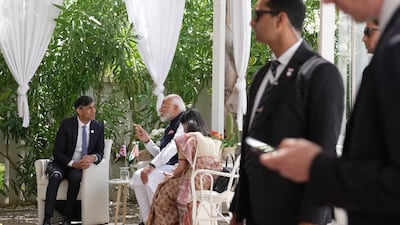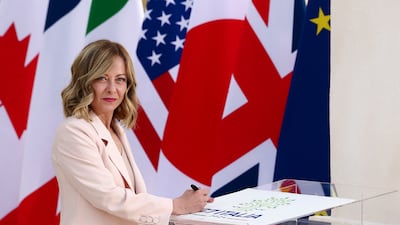Live updates: Follow the latest news on Israel-Gaza
Group of Seven leaders said they were very concerned by the situation on the Israel-Lebanon border, at a summit of the top western nations in Italy on Thursday.
After a session on the Middle East at the start of the two-day summit, officials said attention had focused on the border between Israel and Lebanon, where Iran-backed Hezbollah has engaged in escalating retaliatory operations with the Israeli army.
A senior US official said specific security arrangements were needed as the bloc acknowledged that a ceasefire in Gaza was not enough to secure peace in the region.
The meeting also endorsed US efforts to secure a ceasefire, according to a draft communique circulating at the summit in Puglia.
The US, France and Israel have agreed to work together to advance a roadmap presented by Paris this year to defuse tensions between Hezbollah and Israel, French President Emmanuel Macron said.
"With the United States, we agreed on the principle of a trilateral (contact group), Israel, the United States and France, to advance on the roadmap that we proposed and we will do the same with the Lebanese authorities," Mr Macron said at the G7 leaders' summit.
Leaders reaffirmed their unwavering commitment to a two-state solution, just weeks after the Israeli government lashed out at Spain, Norway and Ireland for recognising a Palestinian state.
They called on Israel to refrain from a full-scale offensive in Rafah, “in line with their obligations under international law”. The G7 consists of the US, the UK, Canada, Germany, Japan, France and Italy.
The EU fully supports US President Joe Biden's proposal for a ceasefire, said EU Council president Charles Michel.
The bloc's three priorities are an end to the war, more humanitarian access and a pathway to a two-state solution.
“There is one lesson learnt: security without peace is not security,” Mr Michel told reporters.
“It's a very dark situation but we feel the window of opportunity must be seized so that we can relaunch a serious political track to make a decision regarding a two-state solution.”
Mr Michel was speaking after attending an emergency humanitarian conference for Gaza held in Jordan earlier this week.
“It's important for the EU to be represented and active in those debates,” he said, adding that he planned to debrief G7 leaders about the conversations he held.
Mr Michel lamented the polarisation in Europe caused by the Gaza war.
“There is a high price that we pay,” he said. “First, this is paid by the people specifically in the region but there are terrible consequences for others.”
The EU is an unofficial eighth member of the G7.
Hamas has welcomed the ceasefire proposal, but insists any agreement must secure an end to the war, a demand Israel still rejects.
Israel described Hamas's response to the new US peace proposal as total rejection.
Mr Biden said "the biggest hang-up so far" to a deal on a Gaza truce and hostage release is the Palestinian militant group.
"I've laid out an approach that has been endorsed by the UN Security Council, by the G7, by the Israelis, and the biggest hang-up so far is Hamas refusing to sign on even though they have submitted something similar," he said.
Since a brief week-long truce in November, repeated attempts to arrange a ceasefire have failed, with Hamas insisting on a permanent end to the war and full Israeli withdrawal from Gaza.
US National Security Adviser Jake Sullivan said Hamas had submitted an amended proposal with some minor changes that could be worked out, as well as others that were not in line with what Mr Biden had detailed or that had been embraced by the UN Security Council.
Mr Sullivan said Israel was standing behind the ceasefire proposal Mr Biden outlined in a May 31 speech, and that he had heard no Israeli leader challenge the deal.
The latest war started with a Hamas-led attack on Israel on October 7, during which about 1,200 people were killed and 240 taken hostage. The Israeli military response in Gaza has so far killed more than 37,200.
Mr Biden was expected to update G7 leaders on the ceasefire negotiations and how their countries could support the process, Mr Sullivan said, underscoring the broader implications for increasing tension between Israel and Lebanon.
Mr Biden would discuss “the increasing intensity and scope of the strikes by Hezbollah deeper into Israel, and including into civilian areas”, Mr Sullivan said, adding that a ceasefire in Gaza would help to bring calm to that region as well.
G7 leaders would also compare notes on what he called “the continuing threat posed by Iran, both with respect to its support for proxy forces, and with respect to the Iranian nuclear programme, where we continue to have grave concerns”.


























